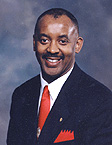 |
Paul Pope Featured In N&O Article |
The Sunday edition of Raleigh’s News & Observer featured Fox 50 Station Manager Paul Pope in a story about race in the workplace. The article, entitled “Work as a second language” appeared on the front page of the Work & Money section of the newspaper.

Paul Pope
Fox 50
Station Manager
|
In the article, N&O staff writer Sabrina Jones focused on the adjustments minorities are often forced to make to fit into predominately white business environments. She interviewed Pope, along with a few other Triangle businesspeople, about how he copes with being a minority at work. He told the story of his 33 year career in broadcasting; Jones wrote that, “Pope developed his corporate style over the years he spent working his way up from a position on a camera crew in the ’60s (complete with Afro and bellbottoms) to station manager of WRAZ-Fox 50. He considers it the result of growing older, growing up.” |
Jones wrote about the workplace language that minorities learn in order to succeed in business, also citing that most people have one way of talking at work and one at home. She even cites a class offered at UNC-Wilmington that helps students lose regional accents to make them sound more professional. Along the same lines, Jones wrote, “Most people have a workplace voice and demeanor; but for African Americans, the adjustments aren’t always seen as simple professionalism. They feel pressure-sometimes self-imposed-to fit into corporate America in order to succeed. To many blacks, getting ahead means blending into another culture–anything different means standing out, and not necessarily in a good way.” She cites Dr. Sandra Slipp, a management specialist who co-wrote the book ‘From the Outside In: Seven Strategies for Success When You’re Not a Member of the Dominant Group in Your Workplace’ as saying, “The issue, a sensitive one for African Americans, is widespread among professionals of color in corporate America.”
N.C. Central adjunct instructor Robert Chapman said, “People who don’t adjust risk not being understood or having their opinions ignored in the workplace.” Jones cited Pope’s comments on his personal experience, “Switching is natural in his profession, says Pope, the WRAZ station manager: ‘You do things to fit the situation-that’s almost mandatory in our society. Society sets a lot of standards that you must adhere to so that you succeed. When you go against the grain, it’s harder. I choose to work here because I feel that I can be myself and I can enjoy what I’m doing.'” Jones told more of Pope’s story: “The balancing act–changing his manner at work without truly changing himself–hasn’t come easily to him. He started out in the broadcast business as a outspoken 18-year-old who frequently spoke his mind. When he was passed over for a promotion because his supervisor thought he was too controversial, Pope re-examine himself. He observed that his supervisors surrounded themselves with people they felt comfortable with, and started planning what he should do to get into higher positions.” Pope added, “I’m a person who has a temper who has learned to control that temper, who is still [very] driven, who is very loyal, who is very opinionated.”
In closing the article, Jones referred to Vincent Ford, who helped write the book “From the Outside In.” She paraphrased Ford saying, “The definition of ‘professional’ is different for blacks, and that’s a reality black professionals must accept….For example, …..some blacks continue to dress formally even on casual dress days because they don’t want to be perceived as knowing less or being in a lower position. ‘If an African American comes to work in a jeans and T-shirt, someone is going to give him the broom,’ Ford says.”
The article ended on a hopeful note, again quoting Ford, “It’s better today than it was when I first started. This is an evolutionary change. We have to keep measuring how well we’re doing in the workplace.”